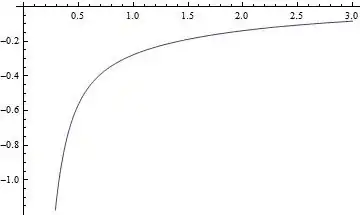For what it's worth, this answer uses derivatives, but it does use a generally applicable method.
Since $a^2+b^2+c^2=3$, any variations, $(\delta a,\delta b,\delta c)$, of $(a,b,c)$ must satisfy
$$
a\,\delta a+b\,\delta b+c\,\delta c=0\tag{1}
$$
We are interested in finding the maximum of
$$
\log(a^3+a+1)+\log(b^3+b+1)+\log(c^3+c+1)\tag{2}
$$
At a critical point, the variations of $(2)$ must satisfy
$$
\frac{3a^2+1}{a^3+a+1}\delta a+\frac{3b^2+1}{b^3+b+1}\delta b+\frac{3c^2+1}{c^3+c+1}\delta c=0\tag{3}
$$
Standard linearity arguments say that if $(3)$ is true for all $(\delta a,\delta b,\delta c)$ that satisfy $(1)$, we have
$$
\left(\frac{3a^2+1}{a^3+a+1},\frac{3b^2+1}{b^3+b+1},\frac{3c^2+1}{c^3+c+1}\right)=k(a,b,c)\tag{4}
$$
That is,
$$
\frac{3a^2+1}{a^4+a^2+a}=\frac{3b^2+1}{b^4+b^2+b}=\frac{3c^2+1}{c^4+c^2+c}\tag{5}
$$
Note that
$$
\frac{\mathrm{d}}{\mathrm{d}x}\frac{3x^2+1}{x^4+x^2+x}
=-\frac{6 x^5+4 x^3-3 x^2+2 x+1}{(x^4+x^2+x)^2}\tag{6}
$$
If $x\ge1$, then $6x^5+4x^3\ge3x^2$ and if $0\le x\le1$, then $2x+1\ge3x^2$. Therefore, for all $x\ge0$, $(6)$ is negative. That is,
$$
\frac{3x^2+1}{x^4+x^2+x}\tag{7}
$$
is monotonic decreasing which, when combined with $(5)$, says that
$$
a=b=c\tag{8}
$$
$(8)$ says that
$$
(a^3+a+1)(b^3+b+1)(c^3+c+1)=27\tag{9}
$$
Condition $(8)$ assumes that (a,b,c) is not on the boundary, that is none are $0$. Suppose that $c=0$, then the same argument yields that $a=b=\frac12\sqrt6$ and therefore
$$
(a^3+a+1)(b^3+b+1)(c^3+c+1)=\frac{83}{8}+\frac52\sqrt6\tag{10}
$$
Suppose that $b=c=0$, then $a=\sqrt3$ and therefore
$$
(a^3+a+1)(b^3+b+1)(c^3+c+1)=1+4\sqrt3\tag{11}
$$
Comparing $(9)$, $(10)$, and $(11)$, the maximum is $27$.
